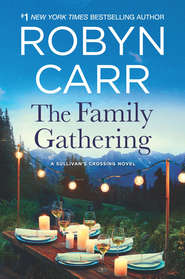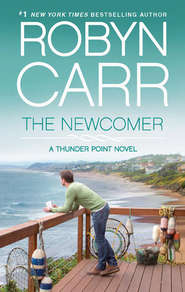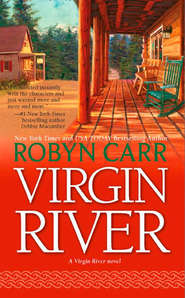По всем вопросам обращайтесь на: info@litportal.ru
(©) 2003-2024.
✖
Sunrise Point
Автор
Год написания книги
2019
Настройки чтения
Размер шрифта
Высота строк
Поля
“I waitressed in high school and worked part-time in a college bookstore. And then I became a mother.”
“Yes, how are the little ones? And who’s watching them for you?”
“The girls are absolutely fine—smart, good-natured, energetic. And one of my neighbors, Adie Clemens, sits with them until day care opens, then she walks them down the street. Adie is an older lady and not a ball of fire, if you get my drift. But she and the girls get along beautifully. And she wants to do this.”
Maxie chuckled. “I know Adie. I’ve known her a long time—she’s always been a little on the fragile side. We’re about the same age, I think. She’s a lovely woman.”
Nora’s mouth dropped open. The same age? Maxie was vibrant, strong and energetic. Adie seemed frail. Health problems and old age must have taken their toll, not to mention the rigors of poverty. Yet another reason to get ahead of this rough patch, Nora thought. “She is lovely,” Nora finally said. “So sweet. She loves my little girls. I’m so lucky.”
“And how are you getting along here, at the orchard?” Maxie asked.
“I’m not as fast as the men, but I bet I’ll catch up. I’m very determined.”
“And is Tom treating you well?”
She glanced away briefly before she could stop herself. She looked back instantly. “He gave me a ride from the crossroad this morning,” she said.
“I know. I had an idea that’s what he was up to when he drove out of here so early. There’s no reason for him to go anywhere before dawn.”
“I told him it wasn’t necessary,” Nora said quickly. “I like walking. I do.”
“You should probably carry a weapon of some kind if you’re walking through the forest before dawn. It’s a rare thing that a human is attacked by a cat or bear, but it’s been known to happen. Sunrise and sunset are busy times for the wildlife—on their way to breakfast or off to bed, thinking they’re all alone… .”
Hah, she thought. She’d never spend money on a gun when she had children to feed and protect. “It was thoughtful of Tom,” she said instead.
“How do you get along with him? Is he giving you trouble?”
She thought about her answer before saying, “I think I annoy him. I think he sees me as a burden, someone he’s forced to look after.”
“It’s probably not so much that as Tom getting used to his new role here. He was raised on this orchard and knows the ropes, but he’s been away. He spent the past several years in the Marine Corps. Two of those years he was deployed, first to Iraq and then to Afghanistan. He separated from the military after his second deployment—there were a lot of casualties in his command, I gather. I’ve noticed a kind of impatience in him that wasn’t there before. Sometimes I catch him brooding and I wonder—has he lost good friends? Comrades? Taking and giving orders—that’s not really the way we’ve been running this business, but that’s what Tom was used to in the military. We’re all going to have to give him time to adjust, I think. I suppose he has issues. Combat issues.”
War? She hadn’t been watching television coverage, obviously, so was left to her imagination and what she’d heard. And what she’d heard people say was terrible! Even with all she’d been through, she couldn’t imagine the war in Afghanistan. She heard a couple of the apple pickers talking about how it had recently been the bloodiest month in Afghanistan so far with the loss of sixty-five soldiers.
And although life had held challenges, incredibly difficult challenges, she and the babies had enough to eat, were safe and warm, healthy. She vowed to never complain.
“Oh, of course,” she said softly. “I had no idea. What could possibly be worse than war? Well, don’t worry, Maxie. He seems perfectly normal to me. He’s been very kind to me. If he’s a little impatient sometimes, I suppose there’s very good reason.”
“One of these days, maybe on a weekend, I’d love to have you and the little girls come to the house. We could include Adie. I’d love to meet them. I hardly ever get to be around little girls. I had a son, then a grandson.”
“That’s so lovely, but I don’t have anything like car seats,” Nora said. “No car, no car seats.”
“I know. Don’t worry about that right now—I would never transport your children without them.”
“That’s very kind of you but you—”
“It’s completely selfish, Nora. I love children. Especially little girls. I hope that fool grandson of mine does something about that before I die.”
* * *
Nora had a great little chat with Maxie but she had to remind herself that they weren’t friends. Maxie owned the orchard; Maxie was her employer. Maxie and Tom. “Are there any other family members?” she asked Buddy when they were dumping their apples one afternoon.
“Nope, that’s it. I hear she raised Tom since he was a baby, but I don’t know anything about why and Maxie’s husband died around ten years ago or so. There’s Junior—the foreman. He’s been on this orchard as long as I can remember, since I was a little kid. He must be just about family.” Then Buddy laughed. “Anyone Maxie cares about is usually considered family. When you know her a little better, you’ll get that.”
“I think I already get that,” she said, thinking of this woman wanting to bring her girls and Adie out for an afternoon, though she hardly knew Nora at all.
This revelation about Tom Cavanaugh caused her to look at him a bit differently. Over the next week she found herself thinking about him and keeping an eye open to catch sight of him. While she was up in the branches of the taller apple trees, on top of her tripod ladder, she would occasionally see him and she could stare without being obvious. He spent a lot of time working with Junior, a big, muscled man of about fifty; they laughed together while they worked. And while Tom loaded large crates of apples into a delivery truck to take to grocers, straining his muscles, she couldn’t help but admire his physique. He dressed the same every day, jeans, boots, his work shirt with the Cavanaugh Apples logo over the left breast pocket, sleeves rolled up, a whisper of soft brown hair on his forearms. His hands were very big and as she could attest, rough with calluses. The muscles of his upper arms, shoulders, back and legs moved under the fabric; that perfect male butt in jeans that weren’t too loose or too tight drew her eyes. Sometimes he seemed to get a little worn out—the tendons in his neck stood out and after putting a crate in the truck, he’d stop to wipe his brow. Then he’d laugh with one of the guys.
She wondered what it must be like to be the kind of girl he’d smile and laugh with. What kind of girl would that be? A pretty and smart young teacher? A model or movie star who would be more than willing to leave the limelight for life on an orchard?
Now and then she’d be staring at him and imagine him in military fatigues rather than his work shirt, carrying a gun rather than a crate of apples and she’d wonder—had his losses been many? Had he been afraid, so far from home in a place of great danger? Did he miss the edge, the adrenaline rush of combat?
Or was coming home to the serene beauty of the orchard a relief? A comfort?
* * *
The following weekend Nora was able to take advantage of some overtime, and what made it even more desirable, it wasn’t a ten-hour day, but just a long morning that ended in early afternoon. Adie assured her she was definitely up to the task of watching the little girls. When Nora walked back into town after work on Sunday, she found Reverend Kincaid waiting for her at Adie’s house, chatting with her outside.
“Well, hello there,” she said to Noah.
“How are you?” he asked.
“Excellent. Put in a good day’s work and still have daylight to spend with my girls.”
“They’re still napping,” Noah said. “Let me walk you to your house—there’s something I want to talk to you about.”
“Sure,” she said. “Are you doing all right, Adie?”
“Fine, dear. I think the girls should be waking up in another half hour, maybe less.”
“I won’t keep you long,” Noah told her. They walked down the street to Nora’s little house and before they even went inside, Noah said, “I have information about your father. He’s alive, still teaching in the Bay Area and he’s been looking for you.”
She was stopped on a dime. “How do you know this?”
“It was pretty quick—I went searching for Jed Crane in the missing-persons registry—my very first stop on the internet. And what I found was that Nora Crane is the one missing.”
Chapter Four
“I responded to the online missing-persons registry with my name and phone number and when I received a call from Jed Crane, I told him that I had known a Nora Crane in Seattle, but I told him I doubted it was the Nora Crane he was looking for—I said I thought the woman I knew was around thirty years old. And I couldn’t provide an address. He was very forthcoming—he’s been looking for you for a couple of years. Nora, I’m sorry to be the one to tell you this—he’s trying to find you because your mother passed away. I couldn’t ask for details without giving you away and there’s nothing on public record about the cause of her death.”
She went instantly pale. “Dead?”
He nodded gravely. “I think we should arrange a meeting with your father. Apparently he has lots of information about your mother and none about you. He said he lost custody of you when you were only four years old.”
“He wanted custody?” she asked, in a state of shock.
“So he says.”
“But I was six. I’m sure I was six—it was first grade. I remember exactly what I did at school that day—I came home and asked where Daddy was and my mother said she didn’t know. That he’d left us.” And so often over the years her mother, Therese, had added that he was no good, that they were better off. She said that getting involved with that man was the biggest mistake of her life, with no regard for how it might make Nora feel.













